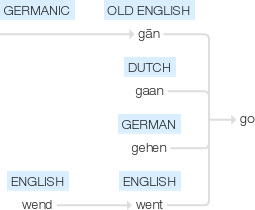Going
Old English gān, of Germanic origin; related to Dutch gaan and German gehen ; the form went was originally the past tense of wend.
wiktionary
Verb form from Middle English goinge, goynge, gayng, variants of gonde, goonde, gaand, from Old English gānde, from Proto-Germanic *gēndz, present participle of Proto-Germanic *gēną, *gāną(“to go”), equivalent to go + -ing. Cognate with West Frisian geanend(“going”), Dutch gaand(“going”), German gehend(“going”), Danish gående(“going”), Swedish gående(“going”).
Noun and adjective from Middle English going, goyng, gaing, gayng, equivalent to go + -ing. Compare German Gehung, Old English gang(“a going”). More at gang.
etymonline
going (n.)
"a moving" in any way, c. 1300, verbal noun from go (v.). The Old English verbal noun was gang "a going, journey; passage, course" (see gang (n.)). Meaning "condition of a road or route for travel" is from 1848, American English; hence to go while the going is good (1907). Going to "be about to" is from late 15c. Goings-on "(questionable) proceedings" attested from 1775.
